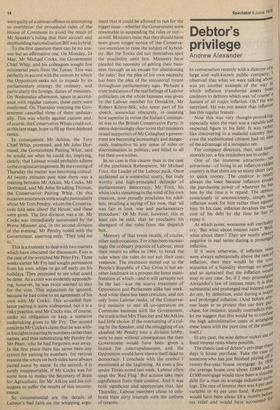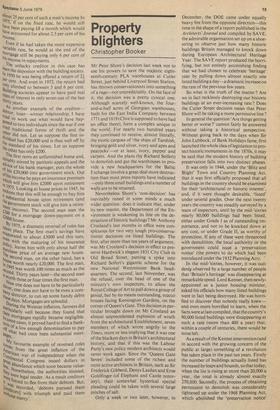Debtor's privilege
Andrew Alexander
In conversation recently with a director of a large and well-known public company observed that what we were talking about was yet another example of the way in
which inflation transferred assets frorn creditors to debtors which was 'of course' 3 feature of all major inflation. Oh? He was surprised. He was not aware that inflation has this regular feature. Now this was very thought-provoking, especially since the man was a capable and respected figure in his field. It was rather like discovering in a malarial country that even the sophisticated citizens had no idea of the advantage of a mosquito net.
For company directors, then, and lesser mortals too, a few reminders are in order:
One of the immense attractions—Yes attractions—of living in an inflation-ridden country is that there are so many short eats
to quick money. The creditor is nearlY always the loser because inflation erodes
the purchasing power of whatever he has lent by the time it is repaid. The debtor, consciously or unconsciously, simplY lets
inflation work for him rather than against him. In his Case, inflation devalues the real cost of his debt by the time he has I° repay it.
At which point, womeone will inevitablY cry: 'But what about interest rates?' Well' what about them ? They are nearly alWaY! negative in real terms during a prolongeu inflation. If it were otherwise, if inflation rates,. were always substantially above the rate 01
inflation, then they would be the CO
sequence of a liquidity shortage so severe, and so sustained that the inflation wool° stop in any case. So, if I may promulgate
Alexander's law of interest rates, it is that substantial and prolonged real interest rates
do not, by definition, exist during a major and prolonged inflation. (And before anY. one leaps in to protest that car hire Or chase, for instance, usually contradicts this, let me suggest that this would be to confuse the high administrative costs of arranging these loans with the pure cost of the moneY itself.)
In any case, the wise debtor makes use of fixed interest rates where possible.
The classic case of debtor's privilege these,. days is house purchase. Take the case 01 someone who has just finished paying off4 twenty-five-year house mortgage. In 19Ja the average house cost about £1800 anu £1500 mortgage would have been a sizeah'` debt for a man on average industrial earn; ings. The rate of interest then was 4 per cent variable or 4i per cent fixed. RepayMene would have been about £8 a month bef°1... tax relief and would have accounted or about 25 per cent of such a man's income.ln 1,975, if on the fixed rate, he would still Lnave been paying £8 a month which would `lave accounted for about 2.5 per cent of his income.
Even if he had taken the more expensive variable rate, he would at the end of the rn..nrtgage still be paying only 6 per cent of nis income in repayments. , The unlucky creditor in this case has 'ten the depositor with the building society. In 1950 he was being offered a return of 2,1 I3er cent. And even in 1972, the return had ehnlY climbed to between 5 and 6 per cent. nuilding societies appear to have paid real rates of interest in only seven out of the last thirty Years. de As another example of the creditor,btor, loser—winner relationship, I have 'ned to work out what would have happened to two individuals since the war if one tried traditional forms of thrift and the ac)tner did not. Let us suppose the first int'hividual has £20,000 and is thus well off by tL'e standard of his times. Let us suppose "e other has only £200. s he first rents an unfurnished home and, ,'11,,ltablY stirred by patriotic appeals and the ,vice of his bank manager, puts the whole °01f his £20,000 into government stock. Out Ins income he pays an insurance premium nIch will give him £2000 upon retirement rrLI,975. Looking at house prices in 1945, he ,'-caons that this will be enough to buy him gthsUbstantial house upon retirement (and ,e government stock will give him a retireit,ent income). The second man uses the c`.,°° for a mortgage down-payment on a `4000 house. tallY 1975, a dramatic reversal of roles has even Place. The first man's savings have eval3nrated to about £3000 and this sum, en with the maturing of his insurance h°11eY, leaves him with only about half the il.hirehase price of an average new house. line second man, on the other hand, has a in-u, se worth nearly £20,000. The first man, '945 was worth 100 times as much as the isnd. Thirty years later—the second man Z,°rth three or four times the first man. ciell°w one does not have to be particularly D, vet-, one does not have to be even a comth"nY director, to run up some handy debts ise days. Mortgages are splendid. Da ,nring the Weimar inflation, farmers did th7icularly well because they found that 1:11. mortgages rapidly became negligible. hots°1-ne cases, it proved hard to find a bankoff e of a low enough denomination to pay p, at had once been substantial mortconiMY favourite example of reversed roles An1 es from the great inflation of the co ertcan war of independence when the grenattnentel Congress issued dollars in less.t abundance which soon became valuethey Nonetheless, the authorities insisted, werewpere legal tender. As a result creditors it 'nrced to flee from their debtors. But, leredi recorded, 'debtors pursued them with Ors] with triumph and paid them out mercy..



































 Previous page
Previous page